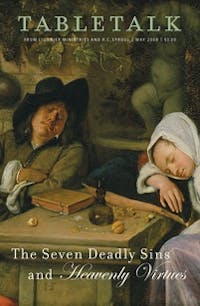
Request your free, three-month trial to Tabletalk magazine. You’ll receive the print issue monthly and gain immediate digital access to decades of archives. This trial is risk-free. No credit card required.
Try Tabletalk NowAlready receive Tabletalk magazine every month?
Verify your email address to gain unlimited access.
My guess is that you can’t guess who the fastest growing debtors in America are. According to the Wall Street Journal (1/19/07, W2), it’s the super rich — not to be confused with the obscenely rich.
The wealthiest one percent of households are piling on a greater percentage of debt than any other income category as they pursue the lifestyles of the top one-tenth of one percent. Yes, it’s a tough day to be super rich when keeping up with the Jones’ doesn’t mean traveling first class but chartering a Lear Jet.
Of course, it’s not just the super rich who spend beyond their means; it’s everyone. In the last twenty-five years, the ratio of household debt to disposable income in the United States more than doubled, rising from 65 percent in the early 1980s to 136 percent in the first quarter of 2007. We’re twice as greedy as we were in the excessive eighties.
Yet I dare say that, for Americans, greed is to sin what North Dakota is to U.S. states — it’s easy to forget that it exists. We confess lust, anger, maybe pride, maybe self-righteousness. But greed? It’s whitewashed. It’s camouflaged. We use words like “lifestyle” or “ambition” or “the American dream.”
But the Bible could hardly be more severe in its condemnation of greed. Twice, Paul calls greed idolatry (Eph. 5:5; Col. 3:5), and he means to grab our attention by doing so. Christians and Jews in the ancient Near East knew idolatry was the nation of Israel’s greatest sin, and both groups regarded it as a defining characteristic of pagans, like sexual immorality. What is idolatry? Idolatry is worshiping, trusting, loving, and obeying gods other than the true God. It’s breaking the first two commandments.
And that’s what greed is. Greed is idolatry. Greed is worshiping, trusting, loving, and obeying worldly treasures rather than God. Greed is breaking the first two commandments. Greed is placing your faith in money rather than in Jesus (Matt. 6:24). And Jesus Himself says that greed is a defining characteristic of pagans, not Christians (Matt. 6:32; see also Eph. 5:3).
Since greed is the root of all kinds of evil, Christians are commanded to flee greed, just as they are to flee idolatry and sexual immorality (1 Tim. 6:10–11; see 1 Cor. 6:18; 10:14). Paul’s warnings could not be clearer: the greedy will have no inheritance in Christ’s kingdom (Eph. 5:5); and the wrath of God is coming because of greed (Col. 3:5–6). Jesus promised the same (Luke 12:15ff.).
Brothers and sisters in Christ, flee greed. Do not assume that your desire for more or bigger or better or newer is spiritually neutral (see 1 Tim. 6:9). Asking God to provide for our earthly needs is good, and he may give generously (Matt. 7:9–11). But can we say with Paul, “If we have food and clothing, with these we will be content” (1 Tim. 6:8; see Prov. 30:8–9)?
How do we flee greed? We flee, for starters, by recognizing that the idolatry of greed is rooted in a diminished view of God. That’s why we love and worship the idols of gold instead. How does our view of God need to grow? Ironically, we need to know that God doesn’t need our money. He owns the cattle on a thousand hills (Ps. 50:9–12). He’s not served by human hands, because He Himself gives us life and breath and everything (Acts 17:25). That’s how big our God is! And it’s out of His overflowing fullness that He has given Himself most fully in His Son, who offers the greatest of feasts for penniless and thirsty sinners (Isa. 55:1–2).
We flee greed by looking to the liberally giving God of the Gospel. We have received all we need in Christ! To the extent then that we find our joy and rest in this God of the Gospel we are able to give liberally with love (see 1 Cor. 13:3). Just as greed defines pagans, increasing measures of liberality defines Christians (see Matt. 25:31–46). (Christians are the true liberals!) So Paul thanks the Philippians for supporting him and reminds them that God will supply all their needs (Phil. 4:18–19). He encourages the Corinthians to give by reminding them that Christ became poor for their sakes (2 Cor. 8:9). He tells them to risk being cheated for the sake of the kingdom (1 Cor. 6:7), as does the author to the Hebrews (10:34).
Consider also the significance of the contexts in which hospitality is commanded in the New Testament, since hospitality pictures aspects of God’s generous love in the Gospel: Romans 12 and the basics of the Christian life; 1 Timothy and a necessary attribute of church leaders, male and female; 1 Peter 4 and how to prepare for the end times.
How do we flee greed? By remembering the Gospel and then giving liberally. Let every check you write to your church be a declaration of independence from the lord of mammon. Your treasure is in heaven, Christian. Jesus says it’s better to give than to receive. Do you believe Him?
